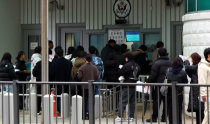Many stabbing rampages are committed by schizophrenics who discontinued treatment
Many stabbing rampages are committed by schizophrenics who discontinued treatment
Posted October. 10, 2023 08:00,
Updated October. 10, 2023 08:00
Seven out of 10 people with a mental health condition who are involuntarily hospitalized went into hospitals at the request of their family members. The government pledged to improve the administrative and emergency hospitalization systems, in which public involvement can be made, and to introduce a judicial hospitalization system as the number of violent crimes committed by people with mental disorders is surging. However, it is under criticism that the responsibility for the patient’s hospitalization and treatment is all on their family members.
“Simply introducing a judicial hospitalization system without reforming the legal guardian system won’t be a fundamental solution to prevent serious crimes committed by the mentally ill,” said the family members of mental patients with severe symptoms during an interview with the Dong-A Ilbo on October 10, World Mental Health Day.
According to the data submitted by the Ministry of Health and Welfare to In Jae-keun, a member of the National Assembly’s Health and Welfare Committee and a member of the Democratic Party of Korea, on Monday, 207,708 mentally ill patients were involuntarily hospitalized for the past five years since 2019 until the end of August this year. Emergency hospitalizations by the police (41,687 cases or 20.1 percent) and administrative hospitalizations by local governments (20,024 cases or 9.6 percent) accounted for less than 30 percent of all cases. Meanwhile, hospitalizations made by legal guardians, which are the family members of the patients, took the biggest share at 145,997 cases or 70.3 percent.
Under the current situation where families bear the burden of hospitalization and treatment for mentally ill patients instead of the country and local governments, there is a limitation of a gap in treatment. The police dispatched in emergencies tend to hesitate to exercise emergency hospitalization over the concerns for potential litigations and complaints if patients’ legal guardians exist.
For example, Ahn In-deuk, who set fire to an apartment unit in Jinju, South Gyeongsang Province, killed five people and injured 17 by stabbing, was excluded from emergency hospitalization as he had a legal guardian. His old mother was in a nursing hospital at the time, but he wasn’t managed by the public system as he had a legal guardian on paper.
cms@donga.com







